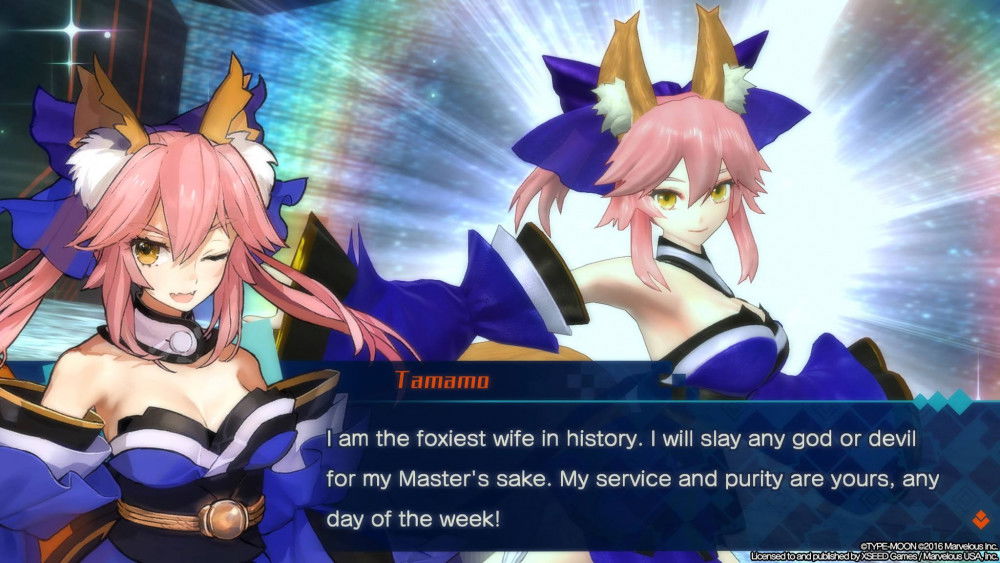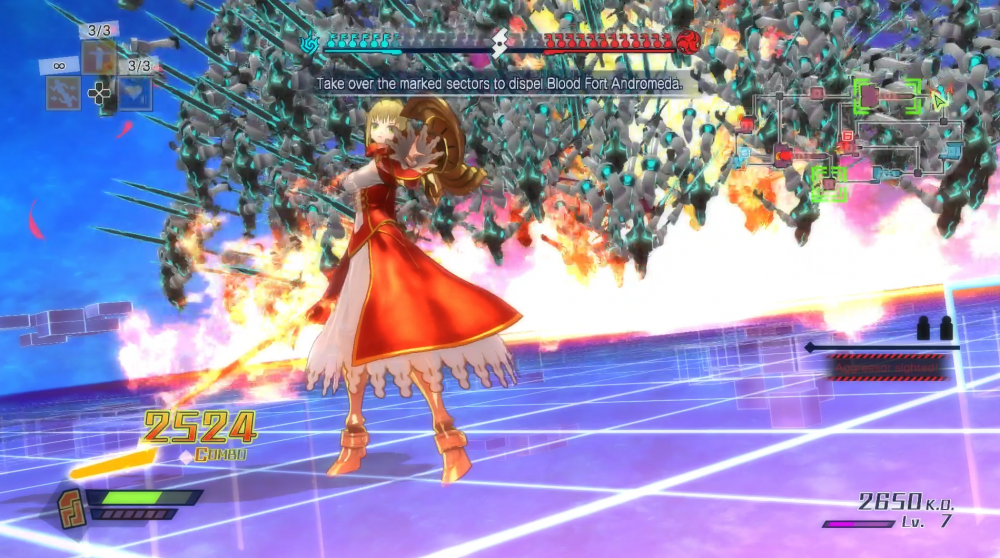There comes a time in any type of fandom where cynicism sets in; a point where tropes stop being seen as tools of articulation and more like crutches. For me, Fate/Extella: The Umbral Star was the breaking point for the Musou genre. Don’t get me wrong, the game’s combat was of good quality, the characters were likable, and the story was interesting enough. However, there is an overarching issue of gameplay stretch that feels like filling out a meatloaf with sawdust. Perhaps that’s a little harsh, but let’s take a look at what about Fate/Extella generates such a response.
Game Name: Fate/Extella: The Umbral Star
Platform(s): PS4 (reviewed), PS Vita
Publisher(s): Marvelous, Xseed Games
Developer(s): Marvelous
Release Date: 1/17/17
Price: $39.99 (Vita) / $49.99 (Ps4)
Before anything else, I must admit that I have never dealt with anything Fate/Stay Night-related, so perhaps there’s something that I’m not getting or appreciating within Fate/Extella. With that said, however, this game is a sequel to a PSP dungeon crawler by the name of Fate/Extra; even at that, it does little to explain the story thus far, giving the same level of recap that one would expect from a biennial series.
To summarize: the player character (a wizard and master) fights in a grand contest called the Holy Grail War with the help of two servants Saber (Nero), and Caster (Tamamo No Mae). Along the way, Caster was in some way abandoned and the Saber/Player character duo win the regalia, a ring that holds supreme authority over the moon cell core. What’s a moon cell core? Well, it’s the semi-sentient central processing unit of the moon; the moon which houses masters and servants alike, which are digital bodies controlled by people in test tubes back on a post-apocalyptic earth ala The Matrix. Kind of a lot to take in, yet the game throws this at you in passing as though it’s entirely certain I already know this.
At any rate, due to an attack by a mysterious titan, the master is broken into three parts: Body, mind, and Soul. As it were, each of these components is assigned to a servant; the mind to Saber, the soul to caster, and the body to the mysterious Altera (who is also a saber [yes, in this world people are typically called by their class above their name]). Each of the three has their own campaign in which they partner with their respective generals through different perspectives on the same events (granted, with differences in story to extend the storyline of the servant in use) in which they must capture the moon’s territories for control of the regalia’s (and master’s) fragments.
Within Fate/Extella, there are two major game elements: Musou gameplay and visual novel exposition. Visual novel bits bring with them character interaction and story progression; laying out the bond between master and servant. The meat of the gameplay, however, is the Musou bit: classic Dynasty Warriors-style combat. The player must mow down massive waves of enemies in order to capture sectors and lure out the level boss, and as one might expect, this can become rather tedious if handled poorly. I have sung praises for Musou games in the past, but Fate/Extella lacks what others in the genre have: variety. Hyrule Warriors gives weapon variety as well as interesting item-dependent boss battles, Senran Kagura forces the player to switch between several characters (with each being very much unique), the list goes on.
Here, each campaign calls for five 30-40 minute sessions of using a single character and just deciding how many times square should be pressed before the triangle button gets thrown into the mix. Ultimately I can understand for cohesion purposes why there wasn’t an attempt to blend all viewpoints together, but at the same time, the campaigns are unlocked one-by-one. For this reason, there is little choice but to just grit your teeth and play the same character for the duration.
As for the narrative, it’s passable. There is supposed to be romantic chemistry between each aspect of the master and his servants, but in reality, it all falls rather flat. Saber keeps talking about all the time they spent together in the past, but none of it is elaborated on; Caster goes for the royal seductress angle but comes off as shallow (granted, at least you don’t need to have played a years-old PSP game to understand her), and Altera is all-around confusing and surprisingly shallowly written for a brand new love interest and tragic villain. Looking past the context of the relationships, the game is all around too short, meaning the shallow romance bits don’t amount to all that much and the serious bits escalate too quickly.
Typically speaking, a chapter goes like this: we’re introduced to the main goal of the mission and who we will fight at the end, the master and servant share a few moments and act like they’re in an erotic game, they suddenly remember they’re not, servant gives a motivational speech, and then gameplay starts.

When all is said and done, however, the game is certainly serviceable. The combat is snappy and easy to get the hang of, characters are still fun even though newcomers will feel left out a bit, and visuals are fairly appealing (especially thanks to the PS4 pro enhancements!). Granted, the interrupted romantic scenes got obnoxious after a while, and only unlocking one campaign at a time makes going through the story a drag. However, each story builds on the gained knowledge from the previous servant’s campaign, allowing the story at large to elegantly blossom.
With that in mind, 40 minutes per stage is pretty steep when you have to do it five times in a row with a single character (sometimes two if you choose a character swap ability for your master). Yes, there is a side story mode that puts the player in control of each servant’s primary general, but indulging in those mid-campaign breaks the flow of story telling fairly harshly, and waiting to do them in between different campaigns does nothing to diffuse the monotony of being stuck with that one servant.

In all, Fate/Extella seems as though it would appeal to those who are fans of the prequel, and each character’s combat style is both unique and interesting. It’s just that even though each character is fun in their own way, there simply isn’t enough time to know them personally as a romantic interest and character in general and yet a bit too much consecutive time spent using them as a combatant.
Ultimately, this is why I have suddenly become jaded by the Musou genre. Like any genre, it is susceptible to less-than-stellar titles, but here it felt more like an attempt to stretch out a short narrative with long spans of repetitive gameplay, with lesser detail being present in things like level design and enemy complexity. It almost feels like a cop out for any intellectual property with the capacity for action, and hopefully, it doesn’t mark a standard for the genre.
*Fate/Extella The Umbral Star was provided to us by Xseed Games for review purposes. For more information on how we review video games and other media/technology, please go review our Review Guideline/Scoring Policy for more info.
Fate/Extella: The Umbral Star
Fate/Extella is a fun little dalliance in the Musou genre by the Fate series, but ultimately proves to be little more. The characters don’t feel particularly deep and the story lacks enough length to give them that extra dimension. In fact, all there really seems to be enough time for is the servants doting on the master until it seems like something lewd’s about to go down until they get interrupted or pull a bait and switch; this leading into a rushed parallel narrative that makes it feel like the gameplay didn’t even matter in the grand scheme of things, with major exploits being taken care of off-screen.
The game is sound in terms of functionality, but for a game that has its roots in visual novels, Fate/Extella serves up a narrative that won’t likely impact many people outside of those who played Fate/Extra six years ago on PSP.
Pros:
- Good combat with more combos at start than other Musous
- Characters are decent if you go in with more of their backstory
Cons:
- Weak characterization
- Not newcomer-friendly
- Lacks character variety
-
Not quite stellar




